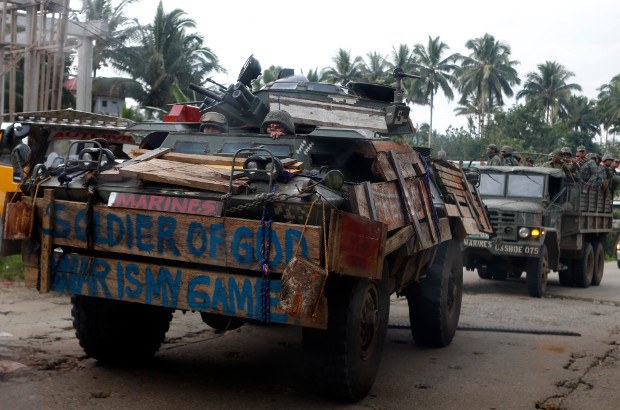Philippine Troops Kill Extremist Allegedly Behind Abduction of Taiwanese in Malaysia
2017.08.14
Iligan, Philippines
 Philippine troops move to the main battle zone in the war-torn southern city of Marawi, where gunmen from the Abu Sayyaf and Maute groups are locked in vicious gun battles with security forces, Aug. 1, 2017.
Philippine troops move to the main battle zone in the war-torn southern city of Marawi, where gunmen from the Abu Sayyaf and Maute groups are locked in vicious gun battles with security forces, Aug. 1, 2017.
Philippine troops killed a ranking leader of the Abu Sayyaf group who was behind high-profile abductions including the 2013 kidnapping of a Taiwanese tourist in Malaysia, the military said Monday.
Abu Sayyaf “subleader” Salvador Muktadil was confirmed killed before dawn Sunday in a gun battle off the southern Philippine island of Sulu, near the town of Parang, about 1,000 km (625 miles) south of Manila, the military said.
His death is considered a big blow to the Abu Sayyaf Group (ASG), which is locked in vicious fighting with the military on several fronts in the south, including in Marawi, a city overrun by another rebel faction led by Isnilon Hapilon.
Hapilon, considered the leader of the so-called Islamic State group in the Philippines, has been entrenched in Marawi since May 23. He is backed by fighters from the local Maute gang and an undetermined number of fighters from the Middle East and Southeast Asia.
‘Suppressed’
Muktadil, (alias Badong), was wanted for the kidnapping of Taiwanese national Evelyn Chang from Malaysia's Sabah state in 2013, and the abductions of Chinese-Filipina Yahong Lim in 2014 and local mayor Gemma Adana in 2015, both from southern Zamboanga Sibugay province.
Chang was kept in captivity for more than a month, Lim was freed after two years and Adana was held for six months. All three were released after alleged payments of ransom.
“Badong is well-experienced in operating speedboats utilized by the Abu Sayyaf as getaway vehicles in executing kidnapping ploys," said Brig. Gen. Cirilito Sobejana, commander of a military task force in Sulu.
"His death rendered high-seas kidnappings, particularly in Tawi-Tawi and Sabah, suppressed," Sobejana said, referring to the Philippines’ southernmost province that shares a sea border with the Malaysian state of Sabah and North Kalimantan in Indonesia.
With armed membership numbering in the low-hundreds, the Abu Sayyaf, or Bearers of the Sword, was founded in the early 1990s to fight for an Islamic state in the south of the predominantly Catholic Philippines.
However, the group burst onto the international scene in the late 1990s after carrying out random attacks, including bombings, abductions and beheadings. During the last decade, they successfully kidnapped and ransomed off a string of American and European hostages.
Military successes on the field decimated its core leadership, but new leaders have emerged. The group is believed to be still holding at least 13 foreign hostages.
In July, two Vietnamese hostages were found decapitated after troops clashed with the ASG in Sulu. The gunmen also beheaded a German captive earlier this year and two Canadians last year after their governments rejected ransom demands.
Human shield slow military’s advance in Marawi
Isnilon led a contingent in attacking Marawi, a city of 200,000 in the main southern island of Mindanao. His forces burned structures and kidnapped dozens of locals, many of whom were being used as human shields, officials said.
The military has poured hundreds of troops in the area in a bid to retake the city, and dropped bombs into rebel strongholds, transforming the once picturesque city into a desolate, pockmarked landscape.
President Rodrigo Duterte, who has placed the entire south under military control, has also sought the help of longtime allies the United States and Australia, which are both providing logistical support, including intelligence gathering.
Neighbors Indonesia, Malaysia and Singapore have also offered greater anti-terrorism cooperation in a bid to stem the flow of militants across borders.
Military: leaders preparing ‘fatwa’
Military spokesman Brig. Gen. Restituto Padilla told reporters in Manila that 41 local executives composed of mayors and governors and local religious leaders were set to declare a “fatwa” or religious edict against the Abu Sayyaf and Maute fighters in Marawi.
The fatwa would denounce violent extremism and would target potential efforts by those fighting in Marawi to rebuild their ranks, Padilla said.
He said the fatwa would likely be issued this week, and could help the military retake Marawi.
Local military officials estimate that from a high of more than 600 rebel fighters, there are just about 20 to 40 fighters left, with the fighting confined to just two villages, Padilla said.
But the key extremist leaders are still alive and are believed well-armed and with a sufficient supply of food, making it difficult for the military to quickly advance, he said.
The extremists were believed to be holding some 300 hostages, including women and several church workers led by a Catholic priest, officials said.
“So the (enemy) force is getting smaller. And their capacity to inflict harm, by the way, is still there because they still have arms, they still have adequate ammunition and … they still continue to hold hostages,” Padilla said.
“So that’s the compounding factor,” he said.







